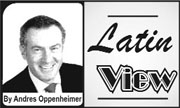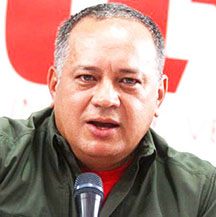There has been a lot of excitement among critics of Venezuela’s authoritarian populist government about new reports confirming that US authorities are investigating Venezuela’s No 2 official on drug trafficking charges, but — unfortunately — the news will have very little political impact in that country.
The May 18 report in The Wall Street Journal, which is based on more than a dozen sources and confirmed previous articles by Spain’s daily ABC that US federal prosecutors are building a drug trafficking case against the president of Venezuela’s Congress, Diosdado Cabello, and other top government officials, will not further discredit the Venezuelan government at home, several well-known Venezuelan pollsters told me.
“Whether it’s true or not, this story has been heard many times in Venezuela,” says Luis Vicente Leon, head of the Caracas-based Datanalisis polling firm. “It may have an impact among the elites, but the people on the street can’t tell the difference between The Wall Street Journal and some obscure website where they may have read this in the past.”
 Leon added that “it won’t have a political impact at the mass level.” Conversely, it won’t help President Nicolás Maduro’s government either, as one could have assumed in light of the slight uptick in Maduro’s popularity after President Barack Obama’s March 9 executive decree denying US visas and freezing US assets of seven Venezuelan government figures suspected of corruption and human rights abuses.
Leon added that “it won’t have a political impact at the mass level.” Conversely, it won’t help President Nicolás Maduro’s government either, as one could have assumed in light of the slight uptick in Maduro’s popularity after President Barack Obama’s March 9 executive decree denying US visas and freezing US assets of seven Venezuelan government figures suspected of corruption and human rights abuses.
At the time, Maduro rallied nationalist support at home by claiming that the sanctions were aimed at all Venezuelans, and his approval rate rose from 22 per cent to 28 per cent, according to Datanalisis figures.
But this time, it will be much more difficult to turn the US drug trafficking probe into his favour. Cabello, a behind-the-scenes leader of Venezuela’s military elite, has an uneasy relationship with Maduro, and is one of Venezuela’s most discredited political figures.

Alfredo Croes, another well-known Venezuelan pollster, agrees that the US drug investigation into Cabello will have a very limited impact at home.
The vast majority of Venezuelans today “are not worried about morally reprehensible issues, but about getting food, because you go to 10 supermarkets and you can’t find meat in any of them, and if you are lucky, you can find chicken in two,” Croes told me.
While until recent months public opinion polls showed that Venezuelans’ No 1 concern was the country’s soaring crime rates, 46 per cent of Venezuelans now say that their first concern is food shortages, followed by 20 per cent who cite inflation and 14 per cent who cite insecurity, Croes said.
Despite having benefited from its biggest oil bonanza in recent years, Venezuela has the world’s highest inflation rate, and Latin America’s worst growth rate. According to the International Monetary Fund, Venezuela’s economy will shrink by as much as 7 per cent this year.
Some leading US drug trafficking experts say the US probe against Cabello will further isolate Venezuela in the international community, but won’t loosen Maduro’s grip on power, nor exacerbate internal divisions within Venezuela’s government.
Maduro and Cabello need one another,” says University of Miami drug expert Bruce Bagley. “The stability of the government hangs on the continued support from the army, and there’s so much corruption in the Venezuelan military, that they know that if they don’t hang together, they will be either tried by a new government or extradited.”
My opinion: The US probe won’t have big political consequences in Venezuela, nor trigger — at least during the remainder of the Obama administration — dramatic US actions.
In the past, US drug probes against top foreign officials accused of drug trafficking have had mixed results. They led to US diplomatic pressures that toppled former Bolivian President Luis Garcia Meza in 1981, and to the US invasion that ousted Panama’s President Manuel Antonio Noriega in 1989, but did not force the resignation of former Colombian President Ernesto Samper in the late 1990s. In fact, Samper is the current leader of the Union of South American Nations.
And, considering that Venezuela is one of the top foreign US oil suppliers, and that Washington has no appetite to suspend Venezuelan oil imports, intervene militarily or do anything that could provoke a rise in world oil prices, the US drug probe against Cabello will have limited consequences.
Venezuela’s government won’t collapse because of the US drug probe. If it happens, it will be because of hyperinflation, worsening food shortages, and a still remarkably strong internal opposition that could win legislative elections this year if Washington and Latin America finally get serious about demanding internationally supervised elections in Venezuela.
© The Miami Herald, 2015. Distributed by Tribune Media Services.




